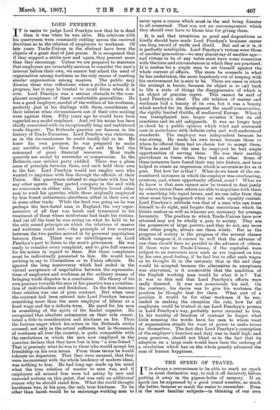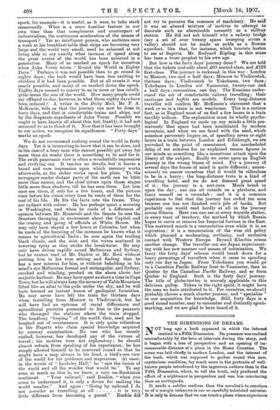THE SPEED OF TRAVEL.
IT is always a convenience to be able to mark an epoch in some distinctive way, to tick it off decisively before putting it away in the pigeon-holes of memory. If an epoch can be expressed by a good round number, so much the better, because so much the easier to remember. Even in the most familiar subjects—in thinking of our own
epoch, for example—it is useful, as it were, to take stock occasionally. What is a more familiar feature in our own time than that complement and counterpart of industrialism, the continuous acceleration of the means of transport ? Yet no intelligent person, who exclaims once a week at his breakfast-table that ships are becoming very large and the world very small, need be ashamed at not being able to say exactly what increase of speed along the great routes of the world has been achieved in a generation. Many of us marked an epoch for ourselves when Jules Verne wrote "Round the World in Eighty Days." Perhaps it was not possible then to go round in eighty days ; the book would have been less exciting to children if it had been possible. But at all events it was nearly possible, and many of us marked down the epoch. Eighty days seemed to convey to us in more or less intelli- gible terms the size of the world. How many people could say offhand to-day, however, to what those eighty days have been reduced ? A writer in the Daily Mail, Mr. F. A. McKenzie, tells us that the journey can now be done in forty days, and that in comfortable trains and ships, not by the desperate expedients of Jules Verne. Possibly we ought to have known all about this, but, frankly, it had not occurred to us to think of it. Now that it has been brought to our notice, we recognise its significance. "Forty days" marks an epoch.
We do not recommend rushing round the world in forty days. Yet it is interesting to know that it can be done, and in the case of a busy man who cannot possibly get away for more than six weeks there is something to be said for it. The swift panoramic view is often a wonderfully impressive and vivifying one. It teaches no details, but it leaves a broad and sure impression upon which memory works afterwards, as the etcher works upon his plate. To the newspaper-reader distant parts of the earth can be little more than names, and the chief actors upon those stages little more than shadows, till he has seen them. Let him once see, them, if only for a few hours, and the picture rises before his vision every time he reads of them for the rest of his life. He fits the facts into the frame. They are radiant with colour. He has perhaps spent a morning in Washington, and when he reads of a difference of opinion between Mr. Roosevelt and the Senate he sees the Senators thronging in excitement about the Capitol, and the coming and going of officials at White House. He may only have stayed a few hours at Colombo, but when he read; of the bursting of the monsoon he knows what it means to agricultural India; he sees again the trailing black clouds, and the mist and the waves scattered in towering spray as they strike the breakwater. He may only have driven rapidly round Melbourne and Sydney, but he cannot read of Mr. Deakin or Mr. Reid without putting him in his true setting and finding that he has a new interest for him, or without beholding in his mind's eye Melbourne formal and rectangular, and Sydney, crooked and winding, perched on the shore above her majestic harbour. He may have spent as short a time in Cape Town, but he will always keep the memory of TableMountain lifted like an altar to the gods under the sky, and he will have learned an instant lesson of geological formation. He may never have left the train for thirteen days when travelling from Moscow to Vladivostok, but he will have had an epitome of racial differences and agricultural pursuits presented to him in the peasants who thronged the stations where the train stopped. The headlong "looping" of the world, then, need not be laughed out of countenance. It is only quite ridiculous in the Pagetts who claim special knowledge acquired by cursory examination. No one who has merely rushed, however, has developed any of the virtues of travel ; his motives were not exploratory ; he should almost refrain from speaking of his experiences ; he has simply allowed himself to be conveyed round so that he might have a map always in his bead, a bird's-eye view of the world for his guidance and inspiration. At most, in the words of " Locksley Hall," he "sew the vision of the world and all the wonder that would be." To say even as much as this is, we know, a very un-Ruskinian sentiment. "Your railroad," said Ruskin, "when you come to understand it, is only a device for making the world 'smaller." And again : "Going by railroad I do not consider as travelling at all . . . . . . it is very little different from becoming a parcel." Buskin did not try to perceive the reliance of machinery., He sail it was an absurd- mixture of 'motives to attempt to decorate such an abominable necessity as a railway station. He did not ask himself why a railway bridge (say a set of over twenty spans sweeping across a valley) should not be made as noble as a Roman aqueduct, like that, for instance, which tourists hasten to see at Segovia. Mr. Rudyard Kipling -in this sense has been a truer prophet to his oem age.
But how is the forty days' journey done ? We are told' that the tickets cost only about .05 second-class, and .2123 first-class. The journey is reckoned in this way : London to Moscow, two and a half days ; Moscow to Vladivostok, thirteen days ; Vladivostok to Yokohama, two days; Yokohama to London rid Vancouver, twenty-one and a half days ; connexions, one day. The Russians under- stand the art of comfortable railway travelling ; their carriages and buffets are models. Every long-distance traveller will confirm Mr. McKenzie's statement that a week or so in a train is not wearisome. This is a curious fact, as in England most of us find a few hours in a train terribly tedious. The explanation must be wholly psycho- logical. In England we made up our minds a little pre- maturely that space had been annihilated by modern invention, and when we are faced with the need, which somehow perversely lingers on, of spending seven or eight hours in a train between London and Edinburgh, we al* provoked to the point of resentment. An unscheduled delay of ten minutes for no explained reason figures in our minds as something like a monstrous attack upon the liberty of the subject. Really we enter upon an English journey in the wrong frame of mind. For a journey of several days the frame of mind is quite different; uncon- sciously we assure ourselves that it would be ridiculotis to be in a hurry ; the long-distance train is a kind of travelling hotel, and we do not demand great speed of it ; the journey is a rest-cure. Meals break in upon the day; one can sit outside on a platform, and fancy oneself on a verandah ; and it is a common experience to feel that the journey has ended too soon because one has not finished one's pile of books. But probably one would read hardly at all in the journey across Siberia. Here you can see at every wayside station, in every tract of territory, the method by which Russia hopes to carve or recarve her Imperial fortune in the East. This eastward march is a renunciation even while it is an aspiration ; it is a renunciation of the wise old policy which planned a moderating, civilising, and exclusive contact with Western Europe. Beyond Kharbin comes another change. The traveller can see Japan experiment- ing with her new manner and means of colonisation. We fancy the forty days' scheme would break down for a heavy percentage of travellers when it came to spending only one day in Japan. From Yokohama you would go in a Canadian Pacific Railway liner to Vancouver, then to Quebec by the Canadian Pacific Railway, and so from Quebec to England. Such is the forty days' journey. The title of globe-trotter is scarcely applicable to this delirious gallop. Taken in the right spirit, it might have the uses we have attributed to it. For ourselves, we should probably choose a much shorter journey, and " specialise " in our acquisition for knowledge. Still, forty days is a good round number, easy to remember sod distinctly epoch- marking, and we are glad to have heard of it.











































 Previous page
Previous page